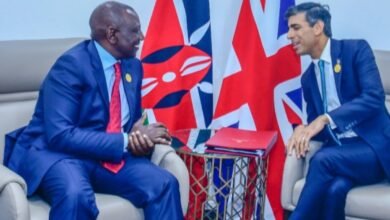
The International Monetary Fund (IMF) has cleared Kenya to receive its second batch of an advanced loan facility of Ksh.43.8 billion.
It is the first reviews of the 38-month Extended Arrangement under the Extended Fund Facility (EFF) and the 38-month arrangement under Extended Credit Facility (ECF) for Kenya.
It is the second disbursement of the overall Ksh.255.9 billion of an Extended Fund Facility (EFF) from the multilateral lender that was approved on April 2, this year.
The first approval was done in late April, where an initial disbursement of Ksh.34 billion was made immediately after the board approved the 38-month review programme, bringing the total disbursements for budget support under the arrangements so far to Ksh.77 billion.
“Kenya’s EFF and ECF arrangements are aimed at supporting Kenya’s program to address debt vulnerabilities, support the response to the COVID-19 crisis and enhance governance,” said IMF.
Kenya is staging an economic recovery despite a recent third wave of COVID-19 pandemic that has so far claimed more than 3,500 lives with over 180,000 cases confirmed.
IMF’s credit facility to Kenya aims to reduce debt vulnerabilities through a multi-year fiscal consolidation effort cantered on raising tax revenues and tightly controlling spending, while safeguarding resources to protect vulnerable groups.
Also Read:
- Kenya to receive second payment of IMF’s Ksh.255 bn loan facility
- Kenyans face job cuts, higher taxes without IMF loan
- Here are IMF conditions to Kenya over Ksh.255 billion loan facility
According to the IMF, Kenya has also made notable advances on its structural reform and anti-corruption agendas. Fiscal governance and transparency are being bolstered by the recent publication of comprehensive audits of COVID-19 related expenditures.
“The Kenyan authorities continue to demonstrate strong commitment to their fiscal reform agenda during this unprecedented global shock. Performance under the EFF/ECF arrangements has been broadly satisfactory despite a challenging environment,” said Ms. Antoinette Sayeh, Deputy Managing Director and Acting Chair of IMF.
Kenya met the fiscal balance target at the end-March by a wide margin and had fully implemented its planned tax policy measures, although, with continuing pressures from the pandemic, tax revenue yields were slightly below expectations, according to the multilateral lender.
IMF Conditions
Kenya’s Financial Year 2021/2022 budget proposal is being aligned with the authorities’ ambitious multi-year plan to reduce debt-related vulnerabilities and it secures resources to support social spending.
National Treasury is on a path to developing a strategy to assess and manage risks to the budget from state-owned enterprises (SOEs).
When IMF approved the Ksh.255.9 billion loan facility in April, it tagged along with some conditions that the Kenyan government had to meet.
This included, among others, restructuring nine state-owned corporations as one of the commitments to access the IMF’s support package.
Among the parastatals that IMF wanted to be restructured included the national carrier, Kenya Airways (KQ), Kenya Power and Lighting Company (KPLC), Kenya Electricity Generating Company (KenGen), and Kenya Ports Authority (KPA).
IMF has since revised Kenya’s 2021 projected economic growth to 6.3 percent.





